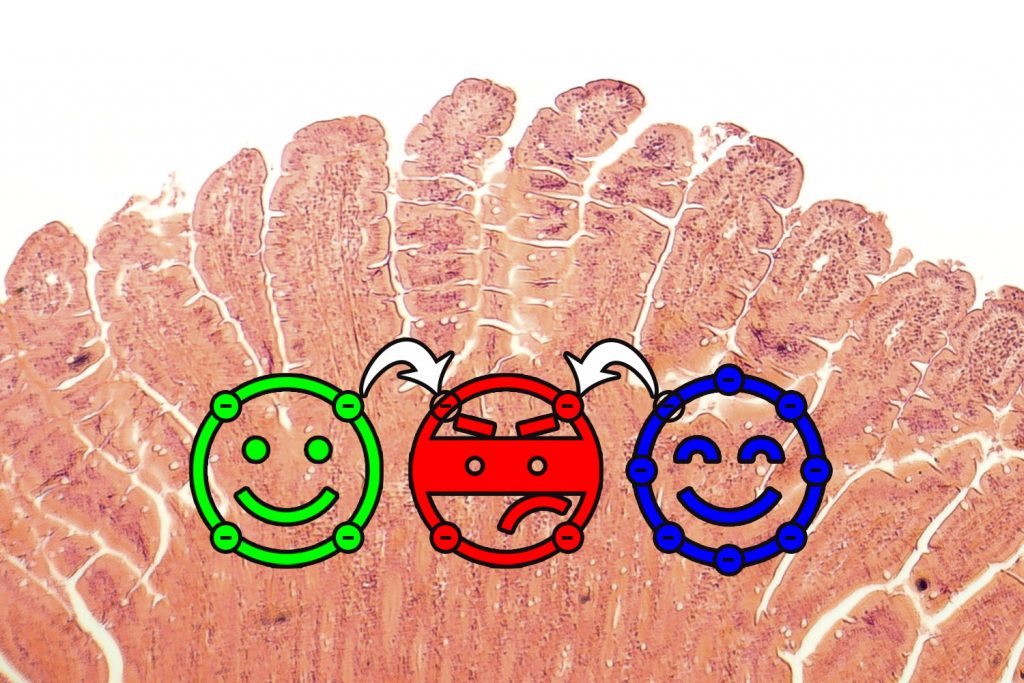08 Feb Oxidative stress: Disruption of gut health

In physiological conditions, digestive epithelial cells and bacteria produce low amounts of free radicals, that are beneficial for the regulation of gut health. The equilibrium between the production of free radicals and their removal by the antioxidant defense system is called “redox balance”, as we explained in this article.
In certain situations, the antioxidant defense system cannot remove excess free radicals in the gut, leading to oxidative stress, a harmful chain reaction that damages all kinds of biological molecules.
The main causes of digestive oxidative stress in farm animals are the following:
- Stress
- Heat stress (More information here)
- Presence of rancid fats in feed (More information here)
- Feed contamination by mycotoxins or heavy metals, especially mercury and arsenic
- Nutrient imbalance (such as vitamin deficiency)
- Administration of antibiotics and other pharmaceutical products
- High concentrations of ammonia in the environment
- The genetic selection of farm animals for fast growth and high productivity puts them at a higher risk of oxidative stress
Oxidative stress impairs the three aspects of gut health
1.Effects on the digestive tissues
The intestinal epithelium is self-renewing continuously, and it is completely regenerated every few days. Developing epithelial cells are particularly sensitive to the action of free radicals, that show a strong affinity to the unsaturated fatty acids present in the cell membrane. Lipid peroxidation leads to changes in the structure and function of the epithelial cells.
Under oxidative stress:
- The regeneration cycle of the digestive epithelium slows down.
- Villi and crypts are not properly developed, impairing nutrient absorption.
- As free radicals are one of the main causes of inflammation, tissues appear inflamed and infiltrated by immune cells.
2.Effects on gut flora
The interaction between gut flora and the redox balance of the digestive system is complex:
- Both beneficial and pathogenic bacteria can stimulate the production of free radicals.
- Certain beneficial bacteria can reduce the concentration of free radicals, by producing antioxidant enzymes or metabolites like short chain fatty acids.
- When certain Gram negative bacteria such as E. coli die, portions of the cell wall become powerful endotoxins called lipopolysaccharides (LPS, more information here). Exposure to high doses of LPS triggers inflammation and oxidative stress, not only in the gut, but also in other organs like the liver and the brain.
In general, oxidative stress is linked to gut dysbiosis, which includes a decline in microbial diversity, a reduction of the number of beneficial species and an increase in pathogenic species.
3. Effects on the gut barrier function
The epithelial tight junctions are a group of proteins that form a barrier to the entry of toxins and pathogens from the intestine to the bloodstream. During oxidative stress, free radicals alter the chemical structure of the epithelial tight junctions, resulting in the loss of the barrier function, and putting the animals at risk of general infections.
Digestive diseases related to oxidative stress
In the recent years, an increasing number of investigations link oxidative stress to many diseases that are accompanied by infections or inflammation:
- Infectious digestive diseases that may be related to oxidative stress: in poultry, necrotic enteritis, malabsorption syndrome, and coccidiosis. In swine, post-weaning diarrhea, especially when the piglets are deficient in vitamin E, a vitamin with antioxidant properties.
- Diseases related to the breakdown of the gut barrier: in poultry, bacterial chondronecrosis with osteomyelitis and colibacilosis, among others; in swine, postpartum dysgalactia syndrome; in ruminant, ketosis and fat accumulation in the liver.
- Sterile inflammation (inflammation not accompanied by infection): any type of inflammation, in example that produced by anti-nutritional factors, will generate free radicals, which lead to oxidative stress in the gut and will, at its turn, worsen the inflammation and cause damage in the tissues, entering a vicious circle that it is difficult to overcome.
Use of phytogenics to relieve digestive oxidative stress
A growing body of evidence in vitro and in vivo shows that antioxidant phytogenics can prevent and ameliorate the dysfunctions caused by oxidative stress in the gut. Research proves that phytogenics can:
- Improve the status of the tissues: phytogenics reduce the microscopic and macroscopic damage on the gut epithelium; have anti-inflammatory effects; stimulate the epithelial regeneration and increase villi height.
- Balance gut flora and prevent the overgrowth of pathogens.
- Reduce the permeability of the intestine, restoring the gut barrier function.
Products of choice
Learn more about our phytogenics for gut health here.
PhytoShield© is an oral emulsion that contains essential oils, electrolytes and vitamins intended to promote growth, reduce oxidative stress, and keep the animals hydrated.
Do not miss any of our articles!
Subscribe to our monthly newsletter

Certain health statements may not be applicable in your region.

